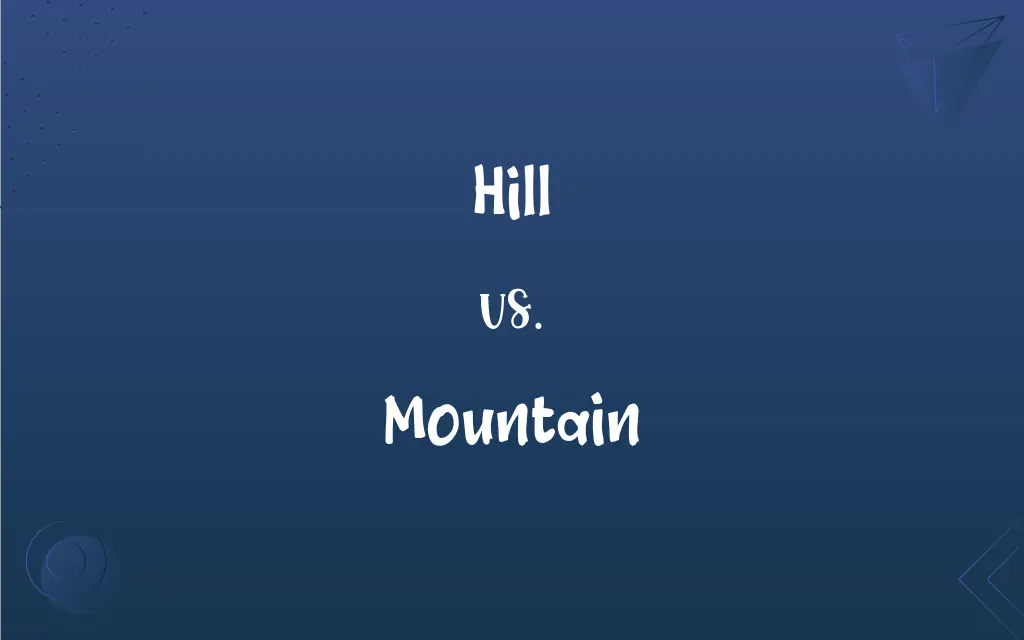Hill vs. Mountain: What's the Difference?
Edited by Aimie Carlson || By Janet White || Updated on June 12, 2024
A hill is a raised area of land with a gentle slope, while a mountain is a much larger elevation with a pronounced peak.

Key Differences
A hill, in its essence, represents a raised portion of the Earth's surface, smaller than a mountain, characterized often by a gentle slope and a rounded top. A mountain, conversely, stands as a significant landform that rises prominently above its surroundings, typically having a peak or summit, steeper slopes, and a notable elevation difference relative to the adjacent landscape.
The classification between a hill and a mountain can sometimes be arbitrary and might differ between regions. In general, mountains are perceived to have a higher elevation than hills. Yet, in some places, a hill might be considered a mountain based on local standards and cultural interpretations.
Beyond the obvious height difference, the formation processes for hills and mountains can also vary. While both can form due to tectonic movements, erosion, or volcanic activity, mountains especially are often the result of convergent plate boundaries or volcanic activity.
Hills are commonly found in landscapes around the world, serving as favorite spots for hikes or recreational activities due to their relatively easier ascents. Mountains, with their majestic and often challenging terrains, attract adventurers, climbers, and those seeking higher altitudes, sometimes even hosting permanent snow or glaciers on their peaks.
It's also worth noting the ecosystems present. Hills might support grasslands, forests, or even urban developments. Mountains, due to their height, can have distinct ecological zones, ranging from temperate forests at the base to alpine conditions at higher elevations, significantly influencing local weather patterns.
ADVERTISEMENT
Comparison Chart
Height
Generally lower in elevation
Higher, notable elevation relative to surroundings
Slope
Gentle slopes and rounded top
Steeper slopes, often with a pronounced peak
Formation
Can be due to erosion, minor tectonic activities, or deposition
Often due to major tectonic forces or volcanic activity
Recreational Use
Easier for hiking and recreation
Attracts adventurers, may be challenging to climb
Ecological Variance
Might support grasslands, forests, or urban areas
Distinct ecological zones from base to peak, influencing weather
ADVERTISEMENT
Hill and Mountain Definitions
Hill
A rounded elevation of land.
She lives at the base of a small hill.
Mountain
A large landform with a peak, rising significantly from its surroundings.
Mount Everest is the highest mountain in the world.
Hill
A landform smaller than a mountain.
The town is surrounded by green hills.
Mountain
An elevated area with distinct ecological zones.
The mountain's base is lush, but its peak is covered in snow.
Hill
A well-defined natural elevation smaller than a mountain.
Mountain
A prominent feature in landscapes, affecting local weather.
The mountain's presence causes rainfall on one side and dry conditions on the other.
Hill
A small heap, pile, or mound.
Mountain
Abbr. Mt. or Mtn. A natural elevation of the earth's surface having considerable mass, generally steep sides, and a height greater than that of a hill.
Hill
A mound of earth piled around and over a plant.
Mountain
A large heap
A mountain of laundry.
Hill
A plant thus covered.
Mountain
A huge quantity
A mountain of trouble.
Hill
An incline, especially of a road; a slope.
Mountain
(countable) An elevation of land of considerable dimensions rising more or less abruptly, forming a conspicuous figure in the landscape, usually having a small extent of surface at its summit.
Everest is the highest mountain in the world.
We spent the weekend hiking in the mountains.
Hill
Capitol Hill. Often used with the.
Mountain
(countable) Something very large in size or quantity; a huge amount; a great heap.
He was a real mountain of a man, standing seven feet tall.
There's still a mountain of work to do.
Hill
The US Congress. Often used with the.
Mountain
(figuratively) A difficult task or challenge.
Hill
To form into a hill, pile, or heap.
Mountain
Wine from Malaga made from grapes that grow on a mountain.
Hill
To cover (a plant) with a mound of soil.
Mountain
A woman's large breast.
Hill
An elevated landmass smaller than a mountain.
The park is sheltered from the wind by a hill to the east.
Mountain
(cartomancy) The twenty-first Lenormand card.
Hill
A sloping road.
You need to pick up speed to get up the hill that's coming up.
Mountain
A large mass of earth and rock, rising above the common level of the earth or adjacent land; earth and rock forming an isolated peak or a ridge; an eminence higher than a hill; a mount.
Hill
(US) A heap of earth surrounding a plant.
Mountain
A range, chain, or group of such elevations; as, the White Mountains.
Hill
(US) A single cluster or group of plants growing close together, and having the earth heaped up about them.
A hill of corn or potatoes
Mountain
A mountainlike mass; something of great bulk; a large quantity.
I should have been a mountain of mummy.
Hill
(baseball) The pitcher’s mound.
Mountain
Of or pertaining to a mountain or mountains; growing or living on a mountain; found on or peculiar to mountains; among mountains; as, a mountain torrent; mountain pines; mountain goats; mountain air; mountain howitzer.
Hill
The raised portion of the surface of a vinyl record.
Mountain
Like a mountain; mountainous; vast; very great.
The high, the mountain majesty of worth.
Hill
To form into a heap or mound.
Mountain
A land mass that projects well above its surroundings; higher than a hill
Hill
To heap or draw earth around plants.
Mountain
A large number or amount;
Made lots of new friends
She amassed a mountain of newspapers
Hill
A natural elevation of land, or a mass of earth rising above the common level of the surrounding land; an eminence less than a mountain.
Every mountain and hill shall be made low.
Mountain
Relating to or located in mountains;
Mountain people
Hill
A single cluster or group of plants growing close together, and having the earth heaped up about them; as, a hill of corn or potatoes.
Mountain
A steep elevation often resulting from tectonic forces.
The mountain range divides the two countries.
Hill
To surround with earth; to heap or draw earth around or upon; as, to hill corn.
Showing them how to plant and hill it.
Mountain
A landform challenging to climb and navigate.
Climbing the mountain requires preparation and equipment.
Hill
A local and well-defined elevation of the land
Hill
Structure consisting of an artificial heap or bank usually of earth or stones;
They built small mounds to hide behind
Hill
United States railroad tycoon (1838-1916)
Hill
Risque English comedian (1925-1992)
Hill
(baseball) the slight elevation on which the pitcher stands
Hill
Form into a hill
Hill
A gentle rise in the landscape.
They picnicked on the hill overlooking the city.
Hill
An area elevated slightly above its surroundings.
He climbed the hill to get a better view.
Hill
A natural bump or mound on the Earth's surface.
Children love to sled down the snowy hill in winter.
FAQs
Can mountains influence weather?
Yes, their height and mass can create distinct weather patterns.
Are there specific plants or animals unique to mountains?
Yes, different ecological zones on mountains support varied flora and fauna.
Can a hill ever be called a mountain?
Classification might differ regionally, but generally, mountains are higher than hills.
Do all mountains have peaks?
Most have a pronounced point, but not all.
Can mountains grow in height?
Yes, tectonic activity can push mountains higher over time.
Can hills be man-made?
While natural hills are common, human activities like mining can create artificial hills.
Do all countries have mountains?
No, some countries like the Maldives are entirely flat.
How are mountains formed?
Mountains can form from tectonic forces, erosion, or volcanic activity.
Are hills easier to climb than mountains?
Typically yes, as hills are lower with gentler slopes.
What's the primary distinction between a hill and a mountain?
A hill is a smaller, gentler rise, while a mountain is a larger, steeper elevation with a peak.
Is there a specific height that differentiates a hill from a mountain?
There isn't a universally agreed-upon height, but local standards might exist.
Can you find rivers originating from mountains?
Yes, many rivers start as streams from mountain glaciers or springs.
Why are mountains considered sacred in some cultures?
Their grandeur, isolation, and challenging terrain can hold spiritual significance.
Why do some mountains have snow year-round?
Higher altitudes have cooler temperatures, allowing snow to persist.
Can caves be found in both hills and mountains?
Yes, caves can form in limestone regions of both hills and mountains.
Do hills and mountains have economic value?
Yes, from tourism, mining, agriculture, to real estate.
Why do some hills have forts or castles on top?
Elevated positions provide strategic advantages for defense.
Are there any benefits of hills in urban areas?
Hills can offer scenic views, recreational areas, and help with drainage.
Is it possible for a mountain to erupt?
If it's a volcano, then yes.
Which is more common, hills or mountains?
Hills are more widespread, but this varies by region.
About Author
Written by
Janet WhiteJanet White has been an esteemed writer and blogger for Difference Wiki. Holding a Master's degree in Science and Medical Journalism from the prestigious Boston University, she has consistently demonstrated her expertise and passion for her field. When she's not immersed in her work, Janet relishes her time exercising, delving into a good book, and cherishing moments with friends and family.
Edited by
Aimie CarlsonAimie Carlson, holding a master's degree in English literature, is a fervent English language enthusiast. She lends her writing talents to Difference Wiki, a prominent website that specializes in comparisons, offering readers insightful analyses that both captivate and inform.































































